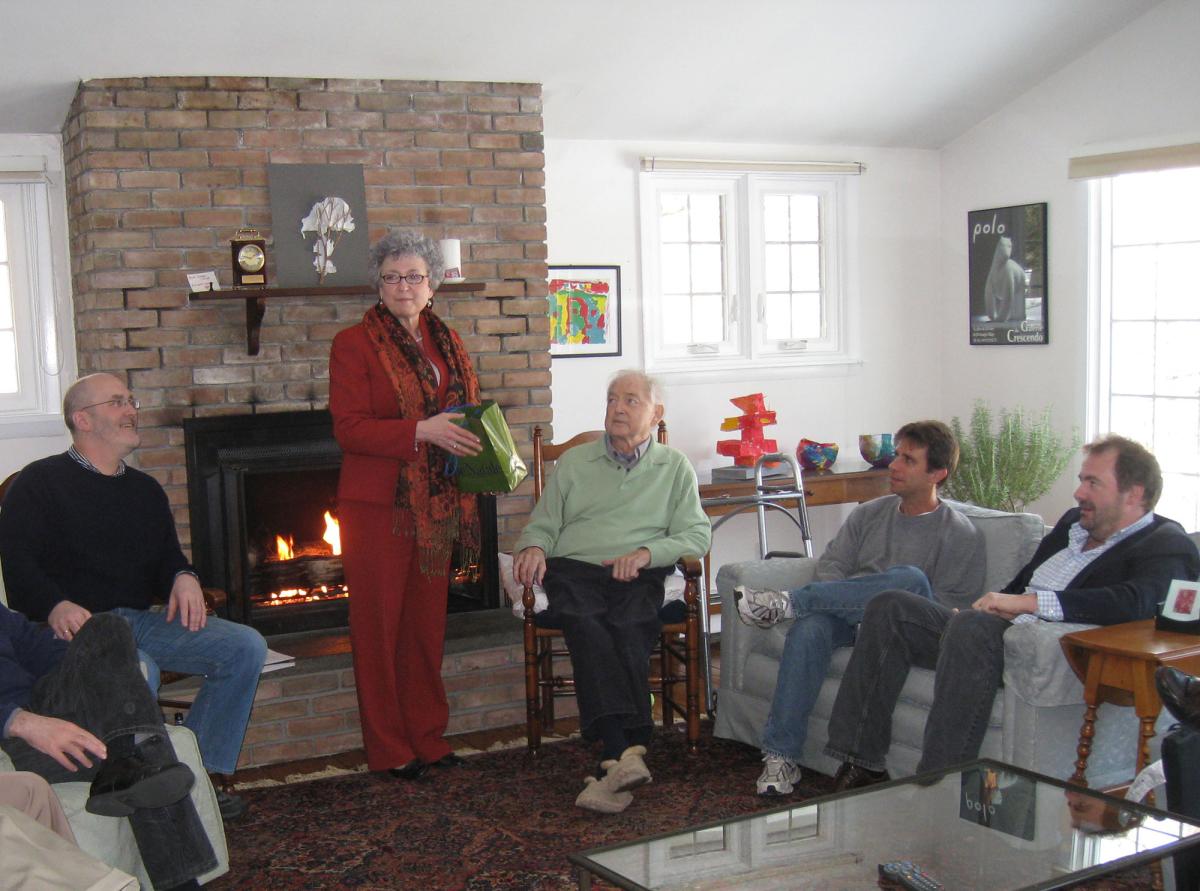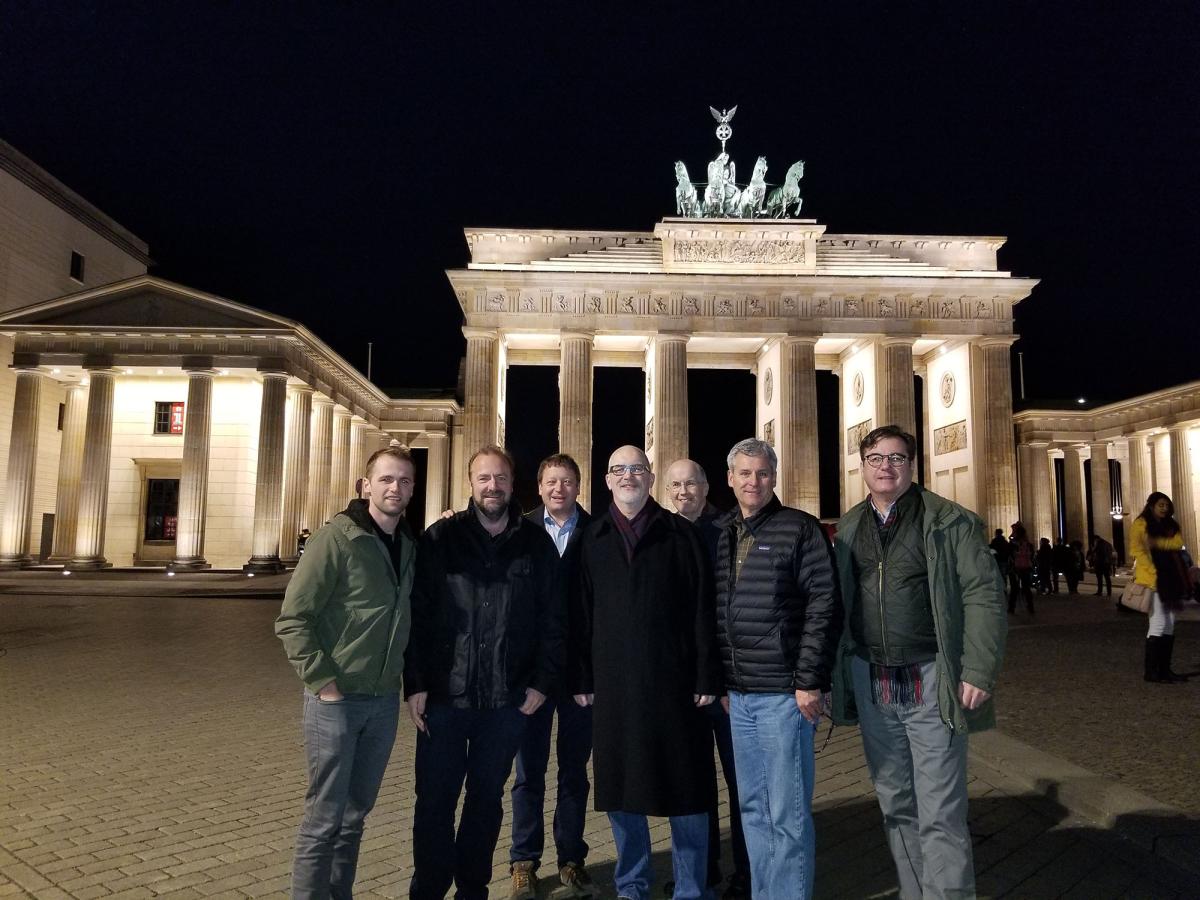
Connecting Threads: History Summit Feels Like Family for Pace Alumni

Since graduating from Pace University, the lives of Jim ’73, Brian ’75, and Denis McCauley ’79, all Dyson alumni, have diverged in many ways—the brothers are sprinkled across time zones and engaged in vastly different professions. But—along with their fraternal ties, of course—their love for history, discourse, and honoring the memories of their former Pace professors remain a constant thread among them in a special way.
The three brothers are among the charter members of the History Summit, an annual gathering of a small group of history-loving Pace alumni who dive into a certain theme or period. The Summit was inspired by former Pace history professor James Holmes, PhD, who began hosting invitation-only extracurricular seminars for undergraduate history students on the Pleasantville Campus in the 1970s. The group would read an assigned book on a particular topic then gather to discuss it, often by the fireplace in Holmes’s living room and to the tune of his children running through the house.
Dr. Holmes taught us how to read critically and analyze things. He would play devil’s advocate to the nth degree, so you had to state your view and be able to defend it, and that, to me, was the most incredibly interesting way to learn.
“Meeting outside of school and the lack of rigidity of Dr. Holmes’s teaching method really helped us,” said Jim McCauley of the seminar. “It was so much more comfortable, and I had so much more enthusiasm for it.”
Denis added: “Dr. Holmes taught us how to read critically and analyze things. He would play devil’s advocate to the nth degree, so you had to state your view and be able to defend it, and that, to me, was the most incredibly interesting way to learn.”
All those involved in the seminar enjoyed it so much they decided graduation wouldn’t deter them from continuing to meet. With Holmes’ blessing, the History Summit was born in 1980.
Viewing the first Summit as a great success, the group continued to meet through the 1980s, but took a hiatus for much of the 1990s and early 2000s. They decided to revive the Summit in 2010 after Holmes had fallen seriously ill.

“He was so important to us. The rationale for going back that first year was to honor him,” said Brian, who had moved back to New York in 2008 to work at the US Mission to the United Nations. When Holmes was not well enough to travel to campus, the Summit would go to him, convening once again by his fireplace.
Sadly, Holmes passed away in 2011, but the Summit has continued. “We weren’t certain we were going to continue after that,” said Brian, “but it had worked so well and we enjoyed it so much, that we said, ‘Yes, we’re going to do this again next year.’”
Since then, the Summit has covered topics from the Cold War to Reconstruction and has spanned locales from the Pleasantville Campus to Berlin and, for the past two years, the Google Meet grid. In the Summit’s current iteration, the group typically consists of around 10 participants, each of whom will read a book related to the year’s theme and then present and discuss their readings with the group.
This year’s Summit, the 26th incarnation, focused on the Nuremberg Trials. An inarguably difficult topic, the discussion paid homage to the late John Buchsbaum, PhD, another beloved former history professor at Pace and original Summit participant, who was a member of the US legal team that mounted the prosecution against the Nazis on trial at Nuremberg.
Buchsbaum’s daughter, Barbara Gilford, recently authored a memoir, Heart Songs, about her family’s experience during the Holocaust, when her grandmother—John Buchsbaum’s mother, Clara—was killed in Auschwitz. Gilford was a guest at this year’s Summit and brought her two adult sons along. A session about her book and her family’s history was interwoven with reminiscing about Buchsbaum, recanting cherished memories for his grandsons, who were captivated by the stories of their grandfather’s time at Pace and the profound impact he had on his students.
Having a history degree, even if you don’t use it directly, still helps you with critical thinking, becoming a better citizen, having a better understanding of the world around you, and the things going on in our own country.
And that’s the magic of the History Summit. The McCauley brothers, as well as regular Summit attendees Paul Doty ’82 and his son US Army Captain Greg Doty ’16 (son and grandson, respectively, of Douglas Doty, PhD, the late chair of the Pace English department on the Pleasantville Campus), actually are family. But all of the Summit participants—though many have come and gone over the years—hold a familial bond that goes deeper than simply an elevated book club. In fact, the connecting threads that exist among and emanate from the Summit participants are at times mind-boggling.
Additionally, Jim McCauley, the eldest McCauley brother, began his education at Pace but left to enlist in the military, returning after serving in Vietnam for two and a half years to finish his undergraduate degree. While Jim was in training at Fort Holabird in Maryland, Buchsbaum was his instructor in an Army Intelligence Officer’s course.
“We didn’t know that until I came back to Pace and took his class,” said Jim. “He and I became friends when I was a student, and after class one day we discussed our history, and I found out he was an Army officer. Then, of course, we realized he taught me in 1967.”
The McCauley brothers’ mother also worked at Pace in the admissions department and was a major influence in all three brothers’ deciding to enroll. After her passing, the brothers set up an endowment in her name, The June Wilson McCauley Research and Opportunity Endowment, that supports research in both the Dyson College of Arts and Sciences and the Lienhard School of Nursing in the College of Health Professions – another small-world connection as Brian’s wife, Jackie DePaso ‘74, was a graduate of Lienhard, a school that was established by none other than Holmes’s in-laws and named for his wife Susan Holmes’s father Dr. Gustav O. Lienhard.
“I can go on and on with the connections to Pace,” said Jim, who coincidentally ended up living next door to the widow of his mother’s boss from the Pace admissions office. “Those connections have been what have helped me the most from my time there.”
All three McCauley brothers express gratitude for how Pace got them to where they wanted to go. Jim, who has had a 40-year career in investment banking, was a history minor as an undergrad and later went back to Pace for his MBA. Brian, who retired from government service in 2012 and has since been consulting part-time, started as a business major, before becoming an English major for one semester. Eventually, Holmes convinced him to study history—a topic that had always interested Brian, though he had been unsure of his career prospects in the field.
Similarly, Denis was originally a marketing major with plans to get a job in his uncle’s prestigious advertising agency after graduation, but found marketing wasn’t for him. After studying history with Holmes, Denis, who is now a freelance writer in London, followed in Brian’s footsteps.
“Every time I’d bump into Dr. Holmes on campus, he’d ask me, ‘When are you going to become a history major?’ And eventually he convinced me,” said Denis. “He would always say ‘I’ve never seen a history major starving in the gutter.’”
While Brian is the only brother whose career has been directly related to history, all three agree that a history degree develops skills that are crucial in any industry in today’s world. And it’s that message that they work to instill in current students, frequently partnering with the Pace admissions, enrollment, and development departments to speak with and advise current students considering studying history.
“Having a history degree, even if you don’t use it directly, still helps you with critical thinking, becoming a better citizen, having a better understanding of the world around you, and the things going on in our own country,” said Brian.
The brothers have also been key donors to the James Holmes International Award, established in honor of the admired professor, which offers much-needed scholarship support to students studying history, economics, and political science.
And they are always encouraging new participants to join the Summit—though they laugh that the interview process can be rigorous, just as Holmes and Buchsbaum would have intended. After all, they need to ensure anyone joining the group can hold their own in a debate.

Like the McCauley brothers themselves, the other History Summit participants have gone on to a wide variety of careers and are spread out around the country and the world. But despite decades of time passed, loss, and now a global pandemic, they always find their way back to each other for impassioned discussions of their favorite subject, even for just one weekend a year. And next year, they’re hoping to take the Summit international once again, visiting Denis in London.
“I don’t often think about it,” Jim said of his connection with his brothers over history, “but the three of us having the same roots, and doing this with the Summit, I just simply enjoy it. I don’t know another way to put it.”